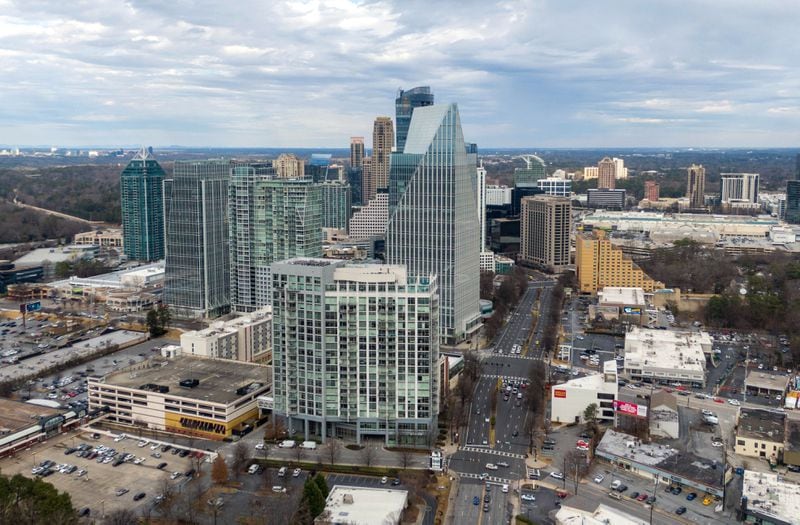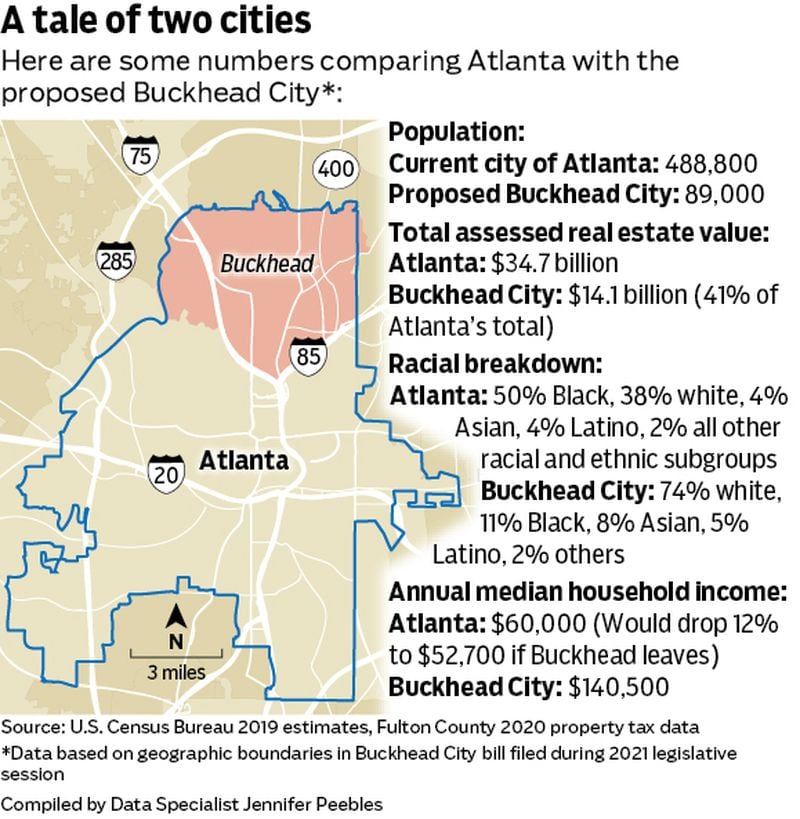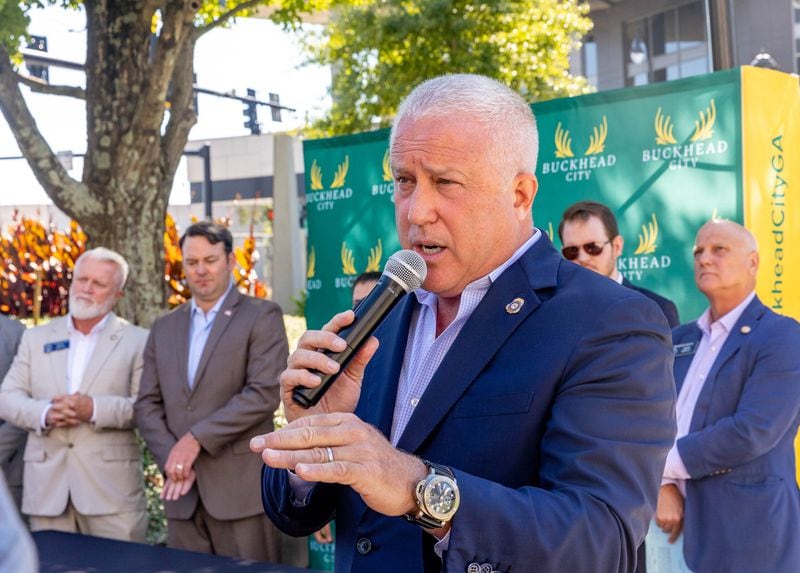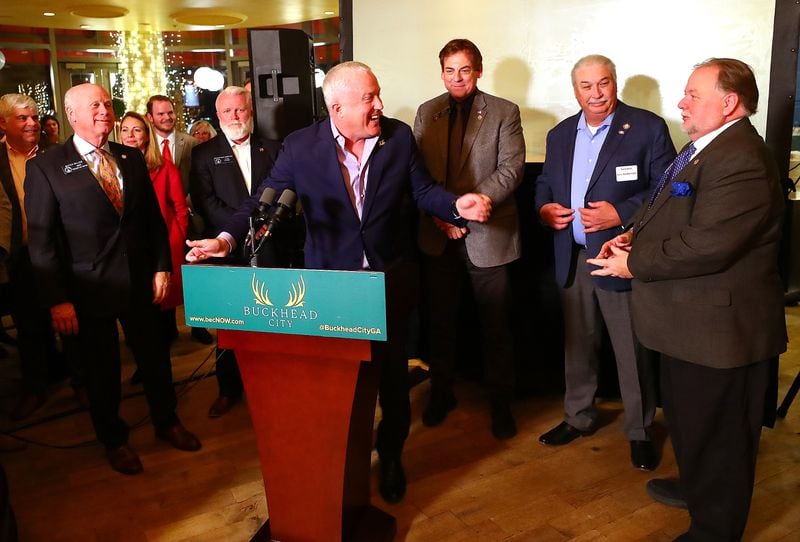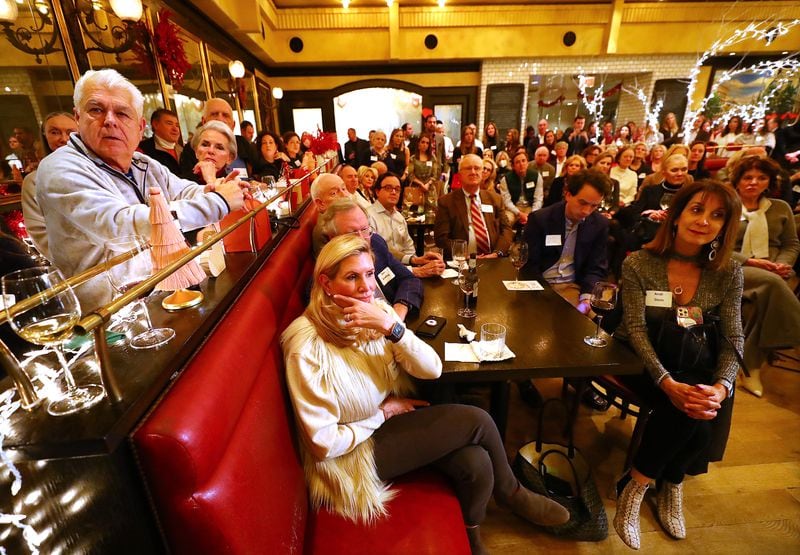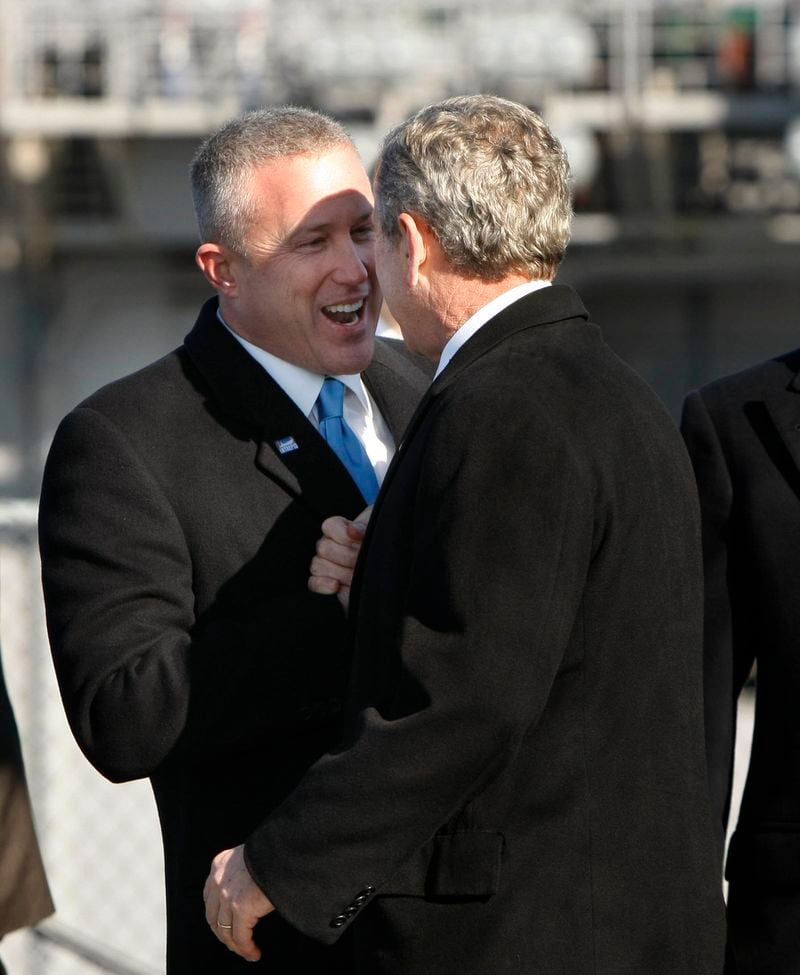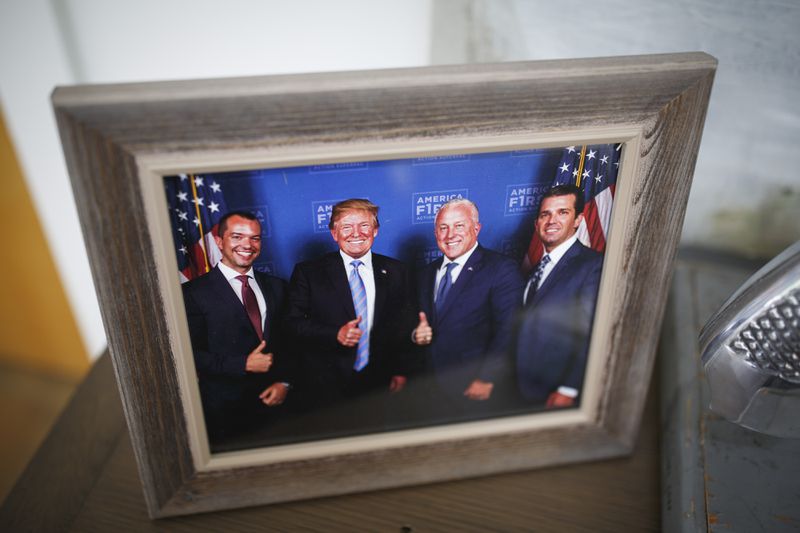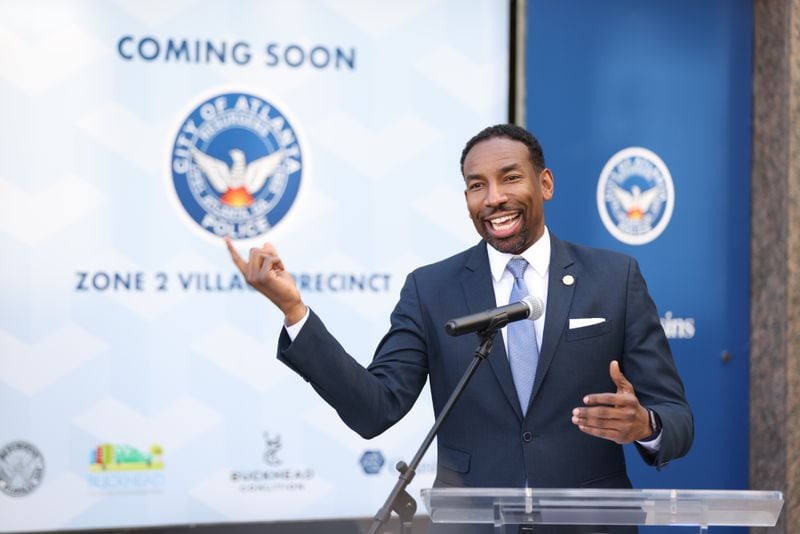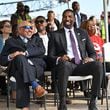Editor’s note: Hours after this story was published, House Speaker David Ralston announced his opposition to advancing Buckhead cityhood legislation this year, effectively scuttling the push for 2022. This story has been updated to reflect the news.
Bill White didn’t start the Buckhead cityhood movement. He didn’t even live in Georgia when early rumblings of discontent first bubbled up, years ago, in the houses that line well-manicured streets on the city’s Northside.
Still, it’s his name that has become most associated with the rancorous campaign for the wealthy community to break away from the rest of Atlanta.
White has heard the rants and seen the flyers.
“I’m a carpetbagger,” he said, repeating characterizations frequently thrown his way. “… I’m a grifter. I’m a financial schemer.”
But he insists that being the target of those opposed to Buckhead cityhood — who say that he’s driven by ego, that he profits off the causes he supports, that he’s racist — doesn’t bother him.
“I love it,” the Buckhead City Committee CEO said. “It gets me up in the morning.”
Since joining what was then the Buckhead Exploratory Committee in late 2020, the 54-year-old New York transplant has elevated the secession push from a small, grassroots campaign to a cause célèbre that organizers say raised about $2 million in roughly a year. With the colorful, ebullient and sometimes abrasive hype-man at its center, the cityhood effort became a political juggernaut.
Along the way, the movement commandeered the attention of the city’s new mayor and became fodder for Fox News’ Tucker Carlson, on whose primetime show White appeared to pound the drum for an independent “Buckhead City.”
The effort was dealt a major blow Friday after House Speaker David Ralston said he wanted to pump the brakes on the cityhood discussion and give new Atlanta Mayor Andre Dickens time to implement his crime plan. The news came a day after Lt. Gov. Geoff Duncan said the effort was in “pause mode” until 2023.
For Buckhead to separate, both chambers of the Legislature would have to greenlight a referendum that would appear on the ballots of Buckhead residents.
The cityhood effort brought a new level of scrutiny to White, a man used to the spotlight. Duncan said Thursday that he’s watched as the cityhood movement continued to “take steps in the wrong direction,” criticizing comments made by White on social media.
A longtime fixture in the New York press, White spent decades cultivating relationships with powerful and wealthy individuals by raising big money for social and political causes. And he hasn’t been shy about leveraging those connections.
Detractors, many of whom believe White is capitalizing on local fears of crime to grow his own political profile, are quick to point out what they say is a transactional approach to politics — especially his flip from fundraising for Hillary Clinton to supporting Donald Trump and questioning the outcome of the 2020 election. His sometimes evidence-free accusations on social media, as well as a New York state investigation that entangled him, also have become ammunition for critics.
Credit: Hyosub Shin/AJC
Credit: Hyosub Shin/AJC
White is unapologetic about his combative style, especially in reference to local leaders he has labeled as incompetent and unscrupulous. He said he believes his mission to create an independent Buckhead is “the right thing to do.” But some people question whether his style is harming the movement more than it is helping.
In a Feb. 4 interview with The Atlanta Journal-Constitution, his husband Bryan Eure by his side, White’s demeanor ranged from warm and chummy to cutting and confrontational, especially when he spoke about feeling mischaracterized or targeted in the media. White initially questioned the AJC’s efforts to reach out to people from his past to learn more about him, though he later apologized and offered a list of people who could speak about his decades in New York.
He ended up answering questions for nearly two hours and posing for photographs, as an aide reminded him about his looming lunch plans. During the interview, two former members of the military who now work security for the cityhood effort watched over the Buckhead City Committee headquarters’ spacious main room. White said he recently received a death threat on social media. Myron Fountaine, a motivational speaker who goes by the moniker “The Prison Doctor,” sat nearby and piped in to defend White’s record on race.
The separation White is championing would have major repercussions in the city, on its politics, its budget and racial makeup.
Buckhead is one of Atlanta’s most important commercial hubs. Its gleaming office towers and luxury shopping centers help account for roughly 40% of the city’s assessed real estate value. Its residents — who are far whiter and more conservative than the rest of the city — make up about one-fifth of Atlanta’s population and a large portion of one of the country’s wealthiest ZIP codes.
“Our movement is a meteor. And meteors do one of two things: They either shine brightly or they smash into something and blow it up,” White said in a video about him that was recently posted on the Buckhead City Committee’s website. “I think we’re going to continue to shine brightly because we’re on a mission. Our mission is pure.”
An unorthodox style
When White joined the Buckhead cityhood push, he wasn’t particularly well known locally as a political power player.
A former volunteer firefighter and EMS worker at his alma mater Fordham University, White said seeing Atlanta’s violent crime and what he perceived as disrespect for law enforcement motivated him to take on the cityhood cause.
”Atlanta, right now currently, is a criminal’s paradise,” he said.
Buckhead has long-established norms for how its business and political class operate and advocate for the Northside, typically through its invite-only civic circles like the Buckhead Coalition and well-organized neighborhood groups. Staid and publicly understated, leaders often have a direct channel to City Hall.
When White became head of the cityhood group last May, after initially serving as vice president of financing, he circumvented those channels in favor of a more direct, in-your-face style. It’s an approach that strays drastically from the way city and business leaders have often handled high-stakes disputes that could negatively affect the way Atlanta is perceived. Many times in the past, Black and white leaders have come together to hash out sticky issues in private before presenting a unified front.
Credit: Jenni Girtman
Credit: Jenni Girtman
White bashes the city’s leadership and other opponents on his social media feeds, where he often posts all-caps defenses of Buckhead City and news stories about crime in Atlanta. On Twitter, he once described former Mayor Keisha Lance Bottoms as a “DISGRACE JOKE CLOWN SHOW.” And, after the city announced its planning director was leaving, White predicted: “WATCH FOR DICKENS TO BRING IN A WORSE PROGRESSIVE NUTJOB.”
“You are all full of shit and we are on to your corrupt ways,” he wrote in a social media post in response to a state representative from Buckhead who opposes cityhood.
White drew blowback recently after he took to Instagram and made a vague, unfounded allegation about transit funding, speculating about the circumstances surrounding the death of MARTA CEO Jeff Parker, who died by suicide last month.
“Anybody who would take a message in that direction, to speak against somebody whose family is grieving, is disgusting in my opinion,” Duncan said Thursday. “We’ll continue to watch people gravitate away from people like him, and gravitate toward solutions.”
Critics say White’s tendency to name-call, exaggerate and present claims without evidence has turned off some longtime residents, business leaders and lawmakers.
“It’s not who we are, as a person from Buckhead. We’re a diverse community who takes the high road when given the option,” said Clark Seydel, a vice president at Transwestern and an opponent of Buckhead cityhood. “And this guy comes in with a different tactic. It’s not aligned with how Buckhead residents have wanted to be represented.”
Seydel, too, was recently the subject of White’s vitriol on Instagram.
“It's not who we are, as a person from Buckhead. We're a diverse community who takes the high road when given the option. And this guy comes in with a different tactic."
White said he initially met with Buckhead Coalition leaders and tried to get them on board, but they didn’t agree with the cityhood mission. He has since embraced his role as chief critic of the city. His “daily inspiration,” he said, is his iPhone screensaver: a smiling picture of Bottoms, photoshopped to show her wearing a hunter green Buckhead City shirt.
“I picked a very flattering photo because she’s a human being, child of God,” he said. “Do you like the shirt?”
Some critics say White’s attacks on the Black former mayor cross a line and that Buckhead’s effort to separate from the city has racial undertones. Adding more aggressive police patrols, some worry, could result in more racial profiling and endanger the lives of Black citizens who come under suspicion.
Credit: Curtis Compton / Curtis.Compton@
Credit: Curtis Compton / Curtis.Compton@
Several prominent businesses, in a letter to lawmakers earlier this month, said the Buckhead secession effort “casts history aside and divides the city,” and hurts Atlanta’s brand, which relies heavily on an image of racial unity, an image of a Black mecca.
White has repeatedly said race has nothing to do with the movement, citing support among some Black residents and business owners.
He recently came under fire for retweeting a post from a blog associated with white nationalists and anti-Semites that equated majority-Black cities with “carnage” and crime, adding a message in support of Buckhead cityhood. He later deleted the post and apologized, saying he retweeted it too quickly.
Since then, White’s allies have stepped up to defend his character.
“We're on a mission. Our mission is pure."
Fountaine, who is Black, pointed out that White invited a Black bishop to bless the committee’s headquarters when it opened. And White pledged $1 million of Buckhead City’s startup budget to Fountaine’s nonprofit to fund mentoring and entrepreneurship programs.
“Those are just not the actions of a skinhead or a racist,” said Fountaine, who declined to weigh in on the issue of Buckhead cityhood, given the nature of his nonprofit work.
Credit: Curtis Compton / Curtis.Compton@
Credit: Curtis Compton / Curtis.Compton@
White’s jabs at the city, though, have helped him garner a loyal following among some neighborhood residents who have long felt slighted by local leaders and feel they deserve a better return on their taxes.
“He’s extremely passionate about this,” said Angelic Moore, who is vice president of government relations for the cityhood group. “He’s constantly on that phone, replying to people. I haven’t heard one person say, ‘I can’t reach him.’ Not one.”
At a recent pro-cityhood fundraiser at the upscale Bistro Niko, White laughed and mingled at ease with the crowd of well-wishers that included residents and business owners. None of the members of the Atlanta delegation in the Legislature, who are all Democrats, was there. But on hand were supportive Republican lawmakers, who represent districts far from Atlanta or Buckhead.
By the end of the night, White announced, the fundraiser had amassed over a quarter of a million dollars.
Cultivating relationships
From an early age, White got a crash course on how to handle people.
When he worked at one of his family’s New York City restaurants, which was visited by John Lennon and Yoko Ono several times a week, his father taught him how to make customers happy and how to charm those who may be disappointed. Ono would send back a dish every time, White said.
“He taught me how, when people are unhappy with too much mayonnaise, too much tomato sauce, you have to make them feel better and just bring a new dish and let it fly. Keep your smile on,” said White, who grew up in Point Lookout, N.Y., a hamlet on the southern end of Long Island.
He entered a career field that would depend on relationships and keeping people satisfied.
He had thought about following his family into the restaurant business, but his life trajectory changed in his early 20s after he organized a fundraiser for the families of military personnel killed during the Persian Gulf War. White said the event raised nearly $1 million for the cause. But it also got him into the orbit of Zachary Fisher, a real estate titan and philanthropist who would become his mentor.
Fisher, a major donor to veterans charities, brought White on as his right-hand man in 1992. At the time, Fisher was seeking to stabilize the finances of the floating military museum he founded aboard the World War II-era aircraft carrier the USS Intrepid.
In that job, White got to meet world leaders and celebrities, local power brokers and big donors as Fisher drummed up support for causes like veterans’ health care and Alzheimer’s research. Among them were a businessman named Donald Trump and then-first lady Hillary Clinton.
Credit: AP
Credit: AP
White worked at the Intrepid Museum for nearly two decades, eventually becoming its president. He was credited in the local press with helping improve the institution’s long-shaky balance sheets, boosting visitors and overseeing a two-year restoration of the 820-foot ship. He speaks fondly of the episode of “The Celebrity Apprentice” that featured a helicopter landing on the carrier’s deck, calling it “one of the greatest opening things in television.”
During that time, he built a Rolodex that rivaled any in New York.
Many of those contacts came out to celebrate White’s 2011 nuptials to Eure, the insurance executive and University of Georgia grad he’d met in an AOL chatroom a decade earlier. The invite list for the 670-person event, held at the Four Seasons restaurant in Manhattan, “read like a telephone book, if the White Pages printed a version containing only the rich and influential,” according to a writeup in The New York Times. Guests included Barbara Walters, Gayle King and a Victoria’s Secret model, and none other than Aretha Franklin was featured as the wedding singer. She belted “I Will Always Love You” as the couple kissed.
The wedding was also billed as a celebration of the repeal of “don’t ask, don’t tell,” a government policy that barred gay, lesbian and bisexual people from serving in the U.S. military if they acknowledged their sexual orientation. White said he had dreamed of becoming a Marine growing up, but shied away from the idea because he was gay.
Several people who knew White in New York, from his days working at his family’s restaurants to veterans philanthropy, described him as a sharp and tireless advocate with a knack for drawing bipartisan attention to causes, such as providing more treatment and support for servicemembers with traumatic brain injuries.
“When Billy believes in a purpose or a cause, it’s 200%,” said Martin L. Edelman, an Intrepid Museum board of trustees member who’s known White for three decades. When White was at the museum, “there was no company, organization or person that Bill wouldn’t be on the phone with trying to explain the importance of supporting the Intrepid and its programs.”
Becoming a power player
While working for Fisher, a major political donor who died in 1999, White soaked in his political and philanthropic philosophy.
“If you like veterans, I like you,” White said, summarizing Fisher’s stance. “And he would say, ‘If you don’t like veterans, I will run you out of office.’ So he would say that to Hillary Clinton, he would say that to the president of the United States, to his face.”
That stuck with White, who at times was pulling in big paydays. In 2009, the year before he left the museum, White made a salary of almost $420,000 and collected another $185,000 in bonuses and incentives, according to public filings. He gave regularly to national and local candidates, particularly those who held political power.
For years, White and Eure were well known as high-profile donors to Clinton. The couple held a $25,000-per-plate fundraiser for then-President Barack Obama in their Chelsea townhouse.
“When Billy believes in a purpose or a cause, it's 200%."
A few years earlier, White’s name was floated as a potential candidate for Obama’s secretary of the Navy. He later was considered for deputy chief management officer at the Pentagon.
At times, White wasn’t shy about reaching out to his high-powered contacts to aid him in his personal life.
When a Citi Bike station was set up outside his New York townhome in 2014, he complained directly to then-Mayor Michael Bloomberg about the “hideous” blue bikes and their proximity to his doorstep. Within an hour, Bloomberg forwarded his complaint to the city’s transportation commissioner. White later told the now-defunct blog DNAinfo New York that his recommended changes were ultimately rebuffed.
In 2016, a car that held White’s personal belongings was stolen from outside his building. He reported that the stolen items included the bronze urns that held his parents’ ashes, a fur coat that was a gift from the Onassis family and a 1977 Yankees World Series ring inscribed by team owner George Steinbrenner. White reached out to several of his contacts, including two former police commissioners and then-Mayor Bill de Blasio. The perpetrators were caught and arrested, but not before his parents’ remains were disposed of in a Brooklyn park, White said.
No political allegiance
After years in New York, White and Eure became accustomed to the spotlight’s glare. But it reached a new level following Trump’s political ascent.
The couple had been prominent Clinton supporters until election night in 2016. They drove from the Democrat’s watch party in Manhattan to Trump’s when it became clear the latter would be victorious, according to a 2018 profile in the Times that detailed their political shift. Trump and White had known each other for years through Fisher and the Intrepid.
“I didn’t want to be part of that misery pie; I’m not a wallower in self-pity,” White told the paper. But, he added, a series of snubs helped fuel his switch.
There was the time that a staffer blocked White and Eure from saying hello to Clinton at the Democratic National Convention. And a few years later, Chelsea Clinton didn’t acknowledge White at an elite Manhattan restaurant, he told the Times.
The couple’s embrace of Trump created rifts with many longtime friends in New York.
White said his main loyalty is to the issues he cares about, which over the years have included veterans, gay marriage and, now, Buckhead cityhood.
“I don’t have any political allegiance to anybody,” White said. “So I can’t shift anything that I’m not allegiant to.”
Credit: NYT
Credit: NYT
Following Trump’s inauguration, White and Eure hosted a $5 million fundraiser for the president and went on to become regulars at White House events.
To many, White’s bombastic style and cadence are reminiscent of Trump — he speaks with a similarly throaty New York accent, goes on the offense against political opponents and often peppers public remarks with exaggerations and hyperboles to make points.
In the days following the 2020 election, White helped raise funds to underwrite Trump’s legal team as it questioned vote counts in several states. White called for recounts and court challenges seeking to overturn the election. He told the Washington Examiner that his team raised $800,000 for the effort in 24 hours.
In now-deleted tweets, he supported the political rally at the U.S. Capitol on Jan. 6. and urged participants to “peacefully enter the Capitol building” and “fight for Trump.”
White later called the events of Jan. 6, which ended in the storming of the building and several deaths, “truly horrific” and condemned the behavior of violent protesters, though he wouldn’t say last year whether he believes the 2020 election in Georgia was legitimate.
‘Not afraid of this’
Shortly after moving to Georgia in 2018 to be closer to Eure’s family, White began mingling in GOP political and donor circles.
That fall, he cut a $2,000 check to the campaign of then-Republican nominee for governor Brian Kemp. He has since donated a total of $4,500 to Kemp. He’s posted photos of him socializing with party heavyweights like former Gov. Sonny Perdue and state GOP Chairman David Shafer and hosted a fête for Richard Grenell, Trump’s ambassador to Germany. Kemp has since appointed White to the state’s 19-member Board of Corrections, which develops policies for employees and inmates in state prisons.
White also got active in his neighborhood organization. Paces is a forested and well-to-do community bordering the Chattahoochee River on the western edge of Buckhead, and White would ascend to the role of president of the Paces Civic Association.
Several board members of the neighborhood group — which totals over 400 homes — said they thought White did a good job as president and viewed him as pleasant to work with.
Some other neighbors told the AJC they became increasingly uncomfortable with White serving in that role as his public profile grew because of the Buckhead cityhood movement.
Credit: Miguel Martinez for The Atlanta Journal-Constitution
Credit: Miguel Martinez for The Atlanta Journal-Constitution
Though White’s term as president was slated to end this March, he ultimately stepped down in mid-December as the cityhood debate was becoming more high-profile and signs for or against the issue sprouted up across Buckhead. He said his work on the cityhood effort required his full attention, and he did not want there to be any perceived conflicts between his work running the two organizations.
Some worried White was alienating City Hall officials. He had a particular animus for Bottoms and lambasted her for not meeting with the residents behind the cityhood effort.
“You would think the mayor would reach out to us and say, ‘How do we talk you off the ledge?’” said White, who never requested a meeting with Bottoms. “It’s not my job to reach out to her.”
He similarly blasted Dickens the morning after his election victory for not prioritizing outreach to cityhood leaders.
“Buckhead MUST be his 1st call today not one among 20,” White tweeted. He said he still hasn’t heard from the new mayor.
In recent weeks, the cityhood group began doing something different: amplifying other voices to speak on behalf of the effort. It recently held a “Voices of Buckhead” event, in which everyday Buckhead residents spoke about their support for the movement.
When asked what he thinks he brings to the effort, White mentioned his lack of ties to the local establishment. Many in Buckhead, he believes, have been long dissatisfied with the status quo but have hesitated to speak up because they don’t like conflict, or they worry it could affect their jobs or standing with their neighbors.
He said he plans to keep pushing for cityhood until the Legislature votes on the issue.
“I’m not afraid of this,” he said.
/cloudfront-us-east-1.images.arcpublishing.com/ajc/5ZVYH72Z5BBMDO7SXLDKUTOPV4.jpg)
